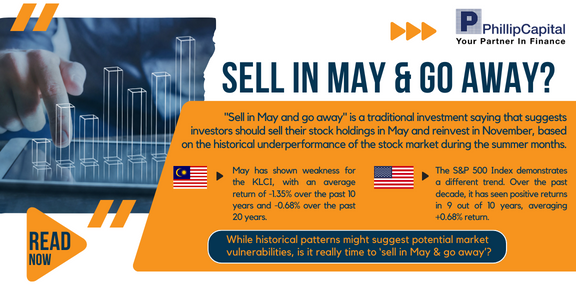
“Sell in May and go away” is a traditional investment saying that suggests investors should sell their stock holdings in May and reinvest in November, based on the historical underperformance of the stock market during the summer months.
When considering the Malaysian market which is represented by the KLCI, historically, May has shown weakness for the KLCI, with an average return of -1.35% over the past 10 years and -0.68% over the past 20 years. In the last decade, only 3 years had positive returns, while 8 out of the past 20 years were positive. This may suggest possible profit taking activities in the near term as investors brace for the adage of ‘sell in May and go away’ (see Exhibit 1 & 2).
On the other side of the globe, the US market which is represented by the S&P 500 Index demonstrates a different trend. Over the past decade, it has seen positive returns in 9 out of 10 years, averaging +0.68% return. However, extending the analysis to a 20-year period, the average return in May drops to +0.19%, impacted by occasional negative returns in 2011, 2012, and 2013 (see Exhibit 3 & 4). Consequently, the MSCI World index, which has a large weightage in the US market, exhibited a positive overall return in May over the past decade (+0.24%), yet displayed a negative return over the past 20 years (-0.43%) (see Exhibit 5 & 6).
If the “Sell in May and go away” paradox proves true, exercising caution might be prudent, particularly when considering the Asia Pacific ex Japan market, as depicted by the MSCI Asia Pacific ex Japan Index. In this market, May has experienced a -1.05% return over the past decade and -1.61% over the past 20 years. Positive returns were observed in only 3 out of 10 years and 6 out of 20 years, respectively (see Exhibit 9 & 10). This can be attributed to the Hong Kong market’s weakness, averaging -1.79% and -1.33% over the past 10 and 20 years, respectively. Positive returns were observed in only 4 out of 10 years and 7 out of 20 years, respectively (see Exhibit 7 & 8).
While historical patterns might suggest potential market vulnerabilities, it is essential to remember that past performance does not guarantee future returns. We believe investors should stay invested for the long term and ignore the short-term volatilities, for the reasons below:
- Long-Term Prospect: Investing is typically a long-term journey. While short-term market fluctuations may cause concern, the long-term trend of the market has historically been upward. By staying invested, investors can benefit from the compounding effect over time.
- Timing the Market is Difficult: Attempting to time the market by selling when it is weak and buying when it is strong is notoriously challenging. Exiting the market in May and re-entering in November based solely on historical trends may lead to missed opportunities if the market performs differently than expected.
- Diversification: A well-diversified portfolio can help mitigate the impact of market weakness in specific sectors or asset classes. A skilled fund manager might opt to increase cash holdings, reduce equity exposure, or switch towards stocks with stronger growth potential during periods of market weakness, so the overall fund performance could be better when the market rebounds. Selling off investments entirely in May may disrupt this diversification strategy.
- Opportunity Cost: While the saying “sell in May and go away” suggests exiting the market during historically weak periods, it also implies being out of the market during potential periods of growth. By staying invested, investors have the opportunity to capture gains if the market performs better than expected during the summer months.
Ultimately, the decision to stay invested or sell during market weakness depends on individual circumstances, risk tolerance, and investment objectives. It is essential for investors to conduct thorough research, maintain a diversified portfolio, and consider seeking advice from professional asset managers to make informed decisions.
Phillip Capital Malaysia and our offerings
We reaffirm our belief that there are still opportunities in the market, and we maintain a discerning approach in choosing high-quality stocks for our portfolio. However, it is crucial to exercise caution and carefully select investment options to ensure the best risk-adjusted returns. By taking a vigilant and discerning approach, investors can potentially reap the benefits of the current market opportunities while minimising risks.
A noteworthy avenue for investors seeking diversification in their portfolio is through PhillipCapital Malaysia. PhillipCapital Malaysia offers multiple private mandate services managed by professional fund managers. By leveraging PhillipCapital Malaysia’s private mandate services, investors can enhance their resiliency, optimise portfolio performance, and navigate the complexities of the market with confidence.
We also offer both conventional and Shariah-compliant options to cater to the needs of all investors. For Malaysia’s mandates, we like:
- PMART/PMA Dividend Enhanced
Our PMART Dividend Enhanced and PMA Dividend Enhanced is an income-driven portfolio focused on high dividend-yielding equities. We apply the Dog of the Dow approach, screen and select top market cap stocks to minimise risk and ensure consistent performance. The portfolio is an equal weighting portfolio which reduces concentration risk and provides similar exposure to all clients, both initially and after rebalancing. We offer both conventional and Shariah investment options to cater to the diverse needs of our investors.
Click here to learn more
- PMART/PMA ESG
Phillip Capital Malaysia offers discretionary portfolio that invests in stocks with high ESG ratings from the F4GBM and F4GBMS Indices, namely PMART and PMA ESG. There are both conventional and Shariah options available. To explore the companies in which both Conventional and Shariah ESG mandates invest, you can refer to the provided link.
- PMART/PMA Blue Chip and Opportunity
Our Blue-Chip portfolios primarily allocate our investments towards companies with large market capitalisations, while the Opportunity portfolios predominantly invest in companies with smaller market capitalisations. We also offer both conventional and Shariah-compliant options to cater to the needs of all investors.
Please click on the link to learn more or email us at cse.my@phillipcapital.com.my if you require any further information.
Disclaimer:
The information contained herein does not constitute an offer, invitation or solicitation to invest in Phillip Capital Management Sdn Bhd (“PCM”). This article has been reviewed and endorsed by the Executive Director (ED) of PCM. This article has not been reviewed by The Securities Commission Malaysia (SC). No part of this document may be circulated or reproduced without prior permission of PCM. This is not a collective investment scheme / unit trust fund. Any investment product or service offered by PCM is not obligations of, deposits in or guaranteed by PCM. Past performance is not necessarily indicative of future returns. Investments are subject to investment risks, including the possible loss of the principal amount invested. Investors should note that the value of the investment may rise as well as decline. If investors are in any doubt about any feature or nature of the investment, they should consult PCM to obtain further information including on the fees and charges involved before investing or seek other professional advice for their specific investment needs or financial situations. Whilst we have taken all reasonable care to ensure that the information contained in this publication is accurate, it does not guarantee the accuracy or completeness of this publication. Any information, opinion and views contained herein are subject to change without notice. We have not given any consideration to and have not made any investigation on your investment objectives, financial situation or your particular needs. Accordingly, no warranty whatsoever is given and no liability whatsoever is accepted for any loss arising whether directly or indirectly as a result of any persons acting on such information and advice.






